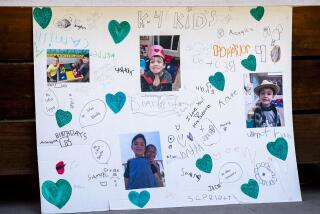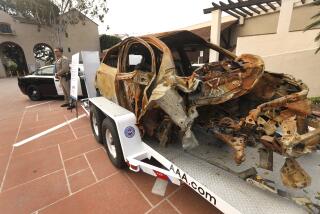Driven to Distraction? Tips for Parents on Coping With Kids, Chaos in the Car
- Share via
If you’ve ever been driving and been hit in the back of the head by a baby bottle launched by a toddler, or had to settle a noisy fight between siblings in the back seat, you know the dangerous distraction that kids can pose in the car.
Since the invention of the automobile, exasperated parents have been rolling their eyes in frustration as children squabble, cry, wrestle and throw up in the back of the family vehicle.
“There is nothing fun about being trapped in a car with a screaming toddler,” says pediatrician and author Elizabeth C. Vinton. Nor is it safe, she warns in her book “How to Set Limits: Defining Appropriate Boundaries of Behavior for Your Children--From Infants to Teens” (Contemporary Books, 1998).
Screaming kids, hungry babies and arguing teenagers can literally drive you to distraction and right off the road.
Despite all the studies and research into what precipitates car accidents, transportation officials don’t know for sure how many accidents can be attributed directly to drivers dealing with noisy or misbehaving kids.
Nevertheless, “we know it’s a problem,” says Stephanie Faul of the AAA Foundation for Traffic Safety. “Anything that takes your eyes and attention off the road is a potential problem, whether it’s kids, a cell phone, cup of coffee or tuning the radio.”
National transportation and law enforcement officials blame a large percentage of accidents on driver errors, including mistakes by those who are distracted or inattentive.
*
For example, of 56,793 fatal accidents in 1996, 3,704, or 6.5%, involved drivers distracted by everything from “eating fast food to screaming at the children,” says National Highway Traffic Safety Administration spokesman Tim Hurd.
Faul stresses that parents must be vigilant in maintaining control in the car: “Unfortunately, there are parents who forget they are parents.”
Even the most firmly secured toddler can hurl a toy that can cause a parent to lose control of the car. And the most angelic children can turn into quibbling terrors when they know Mom or Dad is busy behind the wheel. One bloodcurdling, high-pitched shriek from a youngster can jangle the nerves of the most patient driver.
But parents must establish the rules.
“If children start to act out, you have to pull over at the next possible opportunity and say, ‘We’re not going anywhere until you behave,’ ” Faul says.
The Insurance Institute for Highway Safety also recognizes the risks associated with drivers being distracted by children.
“One of the reasons we say children are better off in the back seat . . . is they are less likely to be a distraction. They’re not going to be crawling on you or whatever,” says Julie Rochman of the institute. The other reason is it’s the safest place in the car.
Having your kids properly secured in an age-appropriate child seat or by a seat belt is critical for keeping them safe and giving the driver peace of mind.
“It astonishes me that people would risk their children’s lives by failing to strap them in,” Faul says.
*
So, short of installing a soundproof, bulletproof partition between the front and back seats, here are some tips on what you can do to keep your sanity and prevent accidents.
* Set firm rules prohibiting loud noise and rambunctious behavior before you get in the car. It’s especially important to repeat the rules to your children’s friends and classmates who may be passengers. For families that participate in car pools, make sure the other drivers follow similar safety rules.
“Don’t pack the kids in like sardines. Don’t yell at the children in the car. Be calm. It’s more effective,” Vinton says. And make sure everyone is buckled up.
If blaring music drives you to distraction in the car, don’t allow it. “The radio dial does not belong to your child. . . . You set the limits. . . . Find a blend of music that both you and your child [usually a teen] accept,” Vinton advises.
* Hungry youngsters will cause you a lot of grief.
“Spare yourself and your child this misery,” she tells readers. “Travel with food [preferably dry], a spill-proof drink, a soft blanket, a sturdy book, a stuffed animal or doll and some music or story tapes.”
* If children are tired and want to nap, make sure they wear their seat belts, even if they lie down on the seat.
“They are light and top-heavy, and in the event of a crash they go . . . usually toward the windshield, head-first,” Faul says.
A final bit of advice from Vinton: “Traveling is supposed to be fun. If you’re yelling at everyone whenever you’re in the car, make some changes. Rearrange the seating. . . . Some kids feed off each other’s misbehavior--really a guarantee for trouble if you’re not careful.”
Remember, a “fun, relaxed trip is also a safer trip, because you, the parent, can concentrate on the task at hand.”
*
Jeanne Wright cannot answer mail personally but will attempt to respond in this column to questions of general interest. Do not telephone. Write to Your Wheels, 1875 I St. N.W., No. 1100, Washington, DC 20006, or e-mail highway1@latimes.com.
* SEAT SMART
With about 100 models of child safety seats on the market, choosing one can be daunting. Good Carma offers relief. G9
More to Read
Sign up for The Wild
We’ll help you find the best places to hike, bike and run, as well as the perfect silent spots for meditation and yoga.
You may occasionally receive promotional content from the Los Angeles Times.






